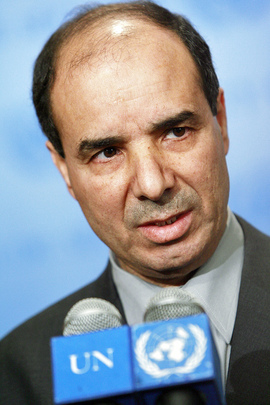At
UN,
Dabbashi Tells Press of Libya Rebel Strategy, Waiting to Take
Sirte, Credentials
By
Matthew
Russell Lee
UNITED
NATIONS,
April 1 -- The Libyan opposition's plans were described
Friday to Inner City Press by former
Gaddafi Deputy Permanent
Representative Ibrahim Dabbashi.
In
a wide ranging
Q&A session, Dabbashi acknowledged that the rebels' attempt at
this time to take Sirte, Gaddafi's birthplace, was a mistake.
We've
told them to hold at Ras Lanuf, Dabbashi said. He said that those who
pushed forward were mostly volunteers, and that from no one “they
will be at the back,” with professional soldiers and commanders at
the front.
Dabbashi
also
argued that UN Security Council Resolution 1973 modifies that arms
embargo to allow arming Libyans to protect civilians. While this
seemed to contradict what he'd said about more and more professional
soldiers in command of the opposition force, he acknowledge that some
countries stick to the “legal” reading: an arms embargo against
Libya as a whole.
Sirte,
according
to Dabbashi, will be the turning point. If after a pause the rebels
can take the town, he predicts there will be more defections by
senior military figures.
Asked
if there are
Western special forces -- or US Central
Intelligence Agency --
personnel working with the rebels, Dabbashi said that wouldn't be
helpful at this time. “The regime would use it,” he said, “even
if they captured only one foreigner.”
Dabbashi
said that
a quick entry and exit might be acceptable, in extraordinary
circumstance like a major battle about to be lost -- but not in
“regular fighting.”
Minutes
earlier,
Inner City Press had asked UN acting Deputy Spokesman Farhan Haq to
describe restrictions on Dabbashi's and Shalgam's “courtesy”
passes to the UN. Haq refused to describe the conditions.
But
Inner City
Press is reliably informed that Dabbashi and Shalgam have been told
by the UN not to speak to the media inside the UN, and that the UN
understands this to cover even interviews done on the UN press floor
above the library. (For that reason, the location of this Q&A is
not being stated.)

Dabbashi on UN mic, previously, now can't speak there, but yes here
Dabbashi
told
Inner City Press that after he spoke at the UN Television stakeout
after the passage of Resolution 1973, “some member states”
complained, saying he and Shalgam no longer represent Libya. He said
he can no longer speak at the stakeout.
Asked
about an
interview by former Nicaraguan foreign minister Miguel d'Escoto
Brockmann in which he called the UN a weapon of the US Empire,
Dabbashi scoffed and called d'Escoto Brockmann a “mercenary
diplomat... trying to represent countries other than his own.” (It
is not clear if d'Escoto Brockmann would be paid by Gaddafi for his
services.)
Dabbashi
said that
the Musa Koussa letter appointing or purporting to appoint d'Escoto
Brockmann is moot after Koussa's defection, and also wasn't signed by
Koussa but rather his deputy.
Dabbashi
did say,
however, that the letter was given “directly” to the Secretariat,
something that Haq has denied. (Then again, Haq has also claimed that
the UN canceled d'Escoto Brockmann's 10 am press conference on March
31 because, suddenly, work was needed on the briefing room.)
Inner
City Press
asked Dabbashi about Gaddafi's and the rebels' relations with the two
opposing forces in Cote d'Ivoire, and in Gabo. Dabbashi said that
Laurent Gbagbo remains close with Gaddafi, so “with the change, we
win one.” He said that Gabon and Ali Bongo have in essence been
bought by Gaddafi.
Inner
City Press
pointed out that Gabon nonetheless voted in favor of Resolution 1970.
“That was pressure from France,” Dabbashi said. “On their own,
it would have been difficult for Gabon to vote for it.”
On
what he called
the diplomatic “game” at the UN, Dabbashi said he is trying for a
meeting of the UN Credentials Committee “next week,” to be
recognized as representing Libya. He said that “some countries”
are still resisting it. Watch this site.
* * *